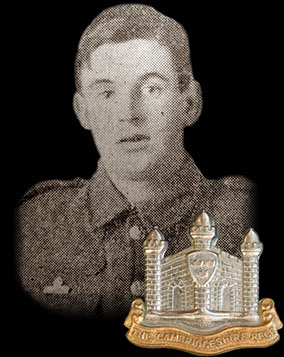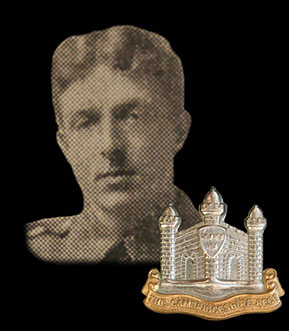A Deadly Foe
By the early summer of 1915 the Cambridgeshires had learnt a great deal about modern trench warfare since arriving in France in February. Their time in the Ypres Salient had given them first hand experience of the dangers of enemy snipers, shellfire, machine guns, massed infantry attacks and even the new terrifying use of gas.
When the men arrived in the Armentieres sector in late May they were told it was the softest part of the whole front line, however within days they were suffering an alarming and regular stream of casualties to the sharp-eyed and lethal German snipers. Many of those hit were young enthusiastic men who had joined in the opening weeks of the war. Two of the young Cambs men who fell in early June were Pte Whitehead from Waterbeach and Pte Allen from March.
Walter Moses Whitehead
Known by his middle name, Moses, he was born in 1896 in Waterbeach, Cambs. In 1907, when he was only eleven, his father tragically died. For a time after this, while still attending school, Moses lived at home with his mother and younger brother. His education, however, came to an early end and he soon went to live and work as a domestic servant for a local businessman named Thomas Mudd.
Thomas Mudd lived with his wife in one of the large houses just off the village green in Waterbeach and they had no children of their own. Thomas was an influential man in the village and was heavily involved in local politics, being an active member of the Liberal Party. In late 1910 he sadly became very ill and died several weeks later. He undoubtedly had had quite an impact on the young Moses, who had only just turned fourteen a few weeks earlier. Moses attended the large funeral leaving a floral tribute on which he had written: In loving memory of my old master, from Moses Whitehead.
After the death of his master Moses remained in the service of Thomas’s wife and her sister who was also a widow. A month after the outbreak of war, at the age of eighteen, he was part of a large group of young friends from Waterbeach who all travelled to Cambridge to enlist in the Cambridgeshire Regiment. He was given the regimental number 2743 and after training joined the men of the old Ely Company as they prepared for deployment overseas.
Moses sailed with the 1/1st Battalion as part of 15 Platoon, D Company on the 14th February 1915 and arrived in France the following day. The next three months were spent in the Ypres Salient and he quickly became familiar with the harshness and dangers of life in the front line. On the 28th May the Cambs moved into the front line in the Armentieres sector, a different world from the Salient. The men had all been told of how little enemy activity there was in the area and that it was widely regarded as the “softest place in France”.
The Cambridgeshires went straight into the front line on 28th May and soon settled in. The first few days passed relatively peacefully, but on night of the 1st/2nd July there was an increase in activity in the area after a daring nighttime intelligence gathering operation resulted in an officer wounded and missing (for more information on this please click here). At some stage Moses took his turn on sentry duty, as he stepped up onto the fire step in order to briefly view the enemy line a single shot was fired. A well concealed and highly skilled German sniper had been waiting for just such a target to appear above the British parapet.
Moses was hit in the head by a single bullet and his comrades immediately rushed to his aid but found him unconscious and gravely wounded. He was quickly taken to the regimental dressing station and from there was loaded into an ambulance. Sadly he ceased breathing in the ambulance while he was being transported to hospital.
Among the letters sent to Moses’s mother was one from his platoon commander, who wrote:
Perhaps it may help to soften the immediate sense of your loss if I may venture to tell you how I, with my opportunities for observation as his officer, was certainly impressed with the quiet way he went about his duty; and this trench warfare, consisting so largely, as it does, of carrying stores under trying circumstances, and of watching and waiting, requires qualities of cheerfulness and patience which he seemed to posses very greatly. May I convey to you sentiments of respectful sympathy, for I have lost too, by his death, a good soldier.
He was buried by the field ambulance unit at the British cemetery at Erquinghem-Lys Churchyard, the epitaph from his mother on his grave simply reading Rest in Peace.
Arthur William Allen
Arthur was born in Holbeach, Lincolnshire in early 1892. His mother, Rose Holland, was an unmarried domestic servant and much of his childhood was spent away from her, staying with various relatives. By the age of nineteen Arthur was living and working as a grocer’s assistant for a relative of his father in Huntingdon. A year or so later he moved to March and found employment with the India and China Tea Stores in the town. He soon settled and made March his home, becoming well known and much liked in the area.
Like Moses Whitehead, Arthur answered the call to arms and enlisted in the Cambridgeshire Regiment in the first week of September 1914. He was given the regimental number 2188 and after training was posted to G Company which was made up of other men from the March area. He continued to serve alongside his friends from March when G Company merged with H Company to form a new, larger D Company in early 1915.
Arthur went to France as part of 13 Platoon, D Company on the 14th February 1915. Like Whitehead he gained vital experience in the Ypres Salient before arriving in the Armentieres sector in late May. In the days immediately following Moses Whitehead’s death the Cambridgeshires had remained in the front line and had lost another man, L/Cpl Ryder, to the deadly German snipers, as well as several more men wounded.
On 5th July, just hours before the Cambs were set to be relieved, Arthur was slightly back from the front line and had just had a wash. As he started to return to the front he was spotted and hit in the head by a sniper’s bullet. He died instantly.
After the Battalion had been relieved from the front line his comrades saw to his burial in a nearby small British military cemetery that was well cared for by local French civilians. Shortly after the war, as part of the concentration of the smaller cemeteries, his body was moved a short distance and he is now buried in Houplines Communal Cemetery Extension.
His Company Sergeant Major who was a fellow March resident and who had known Arthur from before the War, later wrote about him:
Poor boy, he often used to say to me “I feel that I shall get through all right, but if I don’t, I shall have done my little bit”.

Moses prior to going to France in 1915.

Arthur after joining the Cambs in 1914.

This site went live on the 14th February 2015 to mark 100 years since the 1/1st Cambs went off to war.
WE WILL REMEMBER THEM
Email us: cambsregt@gmail.com
Copyright 2015, 2016, 2017, 2018, 2019 by Felix Jackson. The information and images on this site should not be reproduced without prior permission.